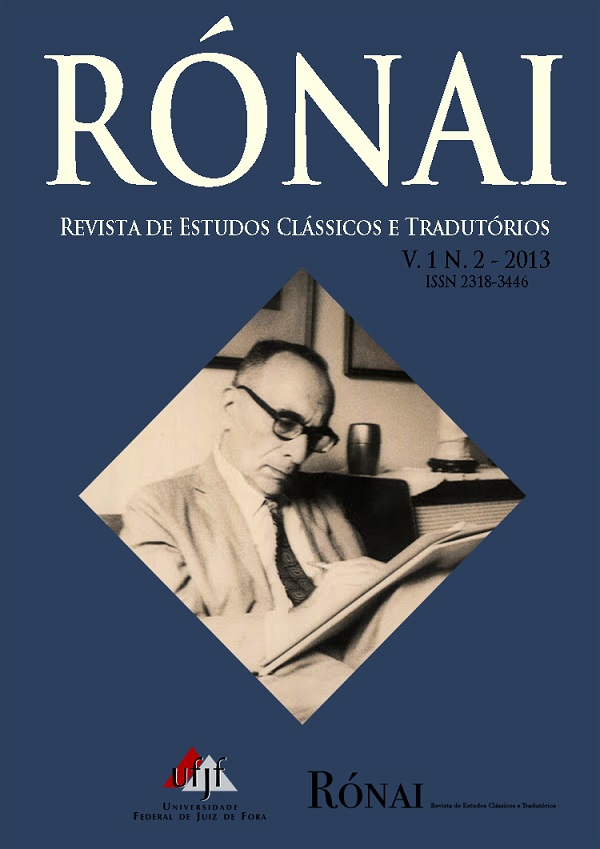Reflexões sobre a relação entre a sátira juvenaliana e a declamatio
Reflexions on the Relation between Juvenalian Satire and Declamatio
Palavras-chave:
Juvenal, sátira latina, declamatioResumo
O trabalho aborda a relação entre a sátira juvenaliana e o fenômeno da declamatio. O estudo observa tais relações a partir da distinção feita por Ribbeck (1859), que propôs serem os poemas juvenalianos divididos em dois grupos distintos: os efetivamente escritos pelo satirista e aqueles que seriam obra de um declamador, tendo sido atribuídos ao poeta. Partindo-se da teoria ribbeckiana, objetiva-se explicitar como a declamatio parece ser fenômeno de amplas implicações em todo o corpus poético de Juvenal, analisando-se, para tanto, especificamente a Sátira 1, a fim de reconhecer ali o tratamento satírico de elementos pertencentes à declamatio.
Abstract
The paper discusses the relation between Juvenalian satire and the declamation phenomenon. The study observes such relations based on Ribbeck’s distinction (1859), which proposed that Juvenal’s poems were divided in two different groups: those in fact written by the satirist, and those that would be the work of a declaimer, having being credited to the poet. From the Ribbeckian theory, the study’s goal is to show how declamatio seems to be a phenomenon of broad implications in the entire Juvenal’s poetic corpus, analyzing, for such a goal, specifically Satire 1, in order to recognize here the satirical treatment of elements that belong to declamatio.
Keywords: Juvenal; Latin satire; declamatio
Downloads
Referências
______. Juvenal and Quintilian. In: ______. Essays on Roman Satire. Princeton: Princeton University, 1982 [1961], p. 396-486.
BELLANDI, Franco. Etica diatribica e protesta sociale nelle satire di Giovenale. Bologna: Pàtron, 1980.
BONNER, S.F. Roman declamation in the Late Republic and Early Empire. Liverpool: Liverpool University, 1949.
BRAUND, Susanna Morton. Declamation and contestation in Satire. In: PLAZA, Maria (Org.). Juvenal and Persius. New York: Oxford University, 2009, p. 450-468.
CAIRNS, Francis. Generic composition in Greek and Roman Poetry. Rev. ed. Ann Arbor: Michigan Classical, 2007 [1972].
CITRONI, Mario. Musa pedestre. In: CAVALLO, Guglielmo; FEDELI, Paulo;
GIARDINA, Andrea. O espaço literário da Roma antiga. Volume I: a produção do texto literário. Trad. Daniel Peluci Carrara & Fernanda Messeder Moura. Belo Horizonte: Tessitura, 2010 [1989]. p. 329-360.
HIGHET, Gilbert. Juvenal, the satirist: a study. Oxford: Clarendon, 1954.
KEANE, Catherine. Satiric memories: autobiography and the construction of Genre. The Classical Journal. V. 97, n. 3, 2002, p. 215-231. Disponível em: http://www.jstor.org/stable/3298094. Acesso em: 17 mai. 2013.
KNOCHE, Ulrich. Juvenal’s cannons of social criticism. In: PLAZA, Maria (Org.). Juvenal and Persius. New York: Oxford University, 2009, p. 257-276
PERSIUS ET IVVENALIS. Satvrae. Edidit brevique adnotatione critica denvo instrvxit W.V. Clausen. New York: Oxford University, 1992 [1959].
ROMANO, Alba C. Irony in Juvenal. Hildesheim; New York: Georg Olms Verlag, 1979.
SENECA THE ELDER. Declamations. Translated by Michael Winterbottom. Cambridge, MA; London: Harvard University, ano. 2v.
Downloads
Publicado
Como Citar
Edição
Seção
Licença
Direitos Autorais
Autores que publicam nesta revista concordam com os seguintes termos:
1. Autores e autoras mantém os direitos autorais e concedem à revista o direito de primeira publicação, sendo a publicação licenciada sob a Creative Commons Attribution License 4.0 Internacional.
2. Os autores e autoras têm permissão e são estimulados(as) a publicar e compartilhar o trabalho com reconhecimento da publicação inicial nesta revista.
3. Os autores e autoras dos trabalhos aprovados autorizam a revista a ceder o conteúdo de seus trabalhos, após sua publicação, para reprodução em indexadores de conteúdo, bibliotecas virtuais e similares.
Para mais informações sobre a Creative Commons Attribution 4.0 International License, acessar: https://creativecommons.org/licenses/by/4.0/
Isenção editorial
O conteúdo dos artigos publicados é de inteira e exclusiva responsabilidade de seus autores, não representando a posição oficial da Rónai - Revista de Estudos Clássicos e Literários ou do Faculdade de Letras da Universidade Federal de Juiz de Fora ou das instituições parceiras.



